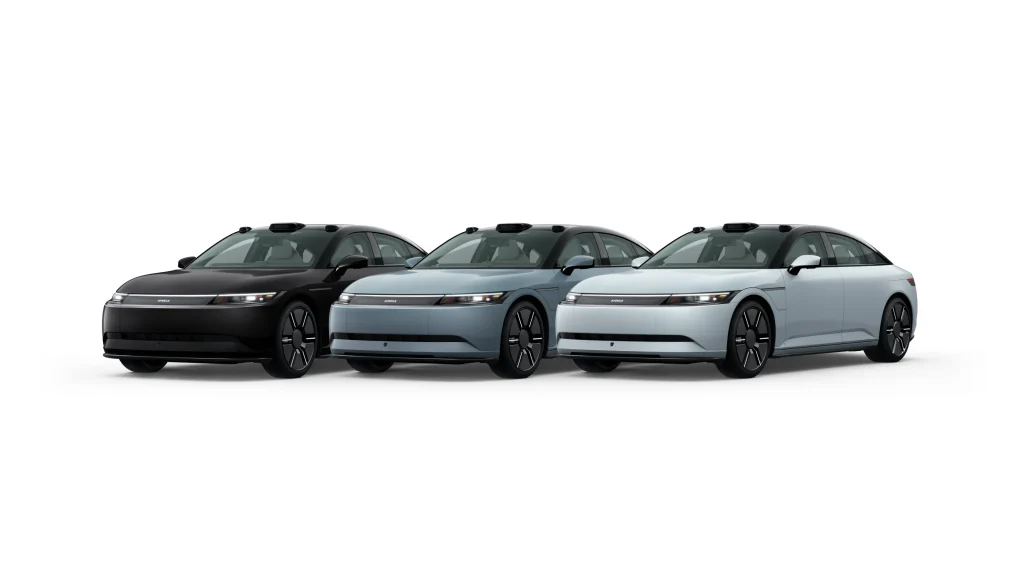
The companies said they are compressing what once took years of trial and error into a span of months, thanks in large part to the use of Qualcomm’s AI100 accelerators hosted on AWS’s cloud infrastructure. By pooling expertise in silicon, artificial intelligence, and cloud computing, the companies are seeking to speed up the development of advanced driver-assistance systems (ADAS) while also reimagining the entertainment and connectivity features that will define the AFEELA.
“Through this collaboration and AWS’s cloud capabilities, we’re helping transform vehicles into hyper-connected mobility hubs that personalize the driving experience in ways that enhance both safety and entertainment,” said Hiroki Takakura, General Manager of Network Service Development at Sony Honda Mobility. “By using Qualcomm accelerators on AWS, we’re shrinking our development timelines—turning months of simulation work into mere weeks and processing unprecedented volumes of drive data.”
The AFEELA, first introduced as a concept car at CES in Las Vegas last year, represents Sony Honda Mobility’s attempt to merge its parents’ respective strengths: Sony’s long experience in entertainment, imaging, and digital technology, and Honda’s decades of automotive engineering. The production model is expected to debut in 2026, positioning it directly in the increasingly competitive field of premium electric vehicles.
At the heart of the effort is a network of 360-degree sensors and AI-powered systems that can interpret a constantly shifting road environment. SHM executives said these systems, designed to fuse data from cameras, radar, and lidar, will allow the car to “see” more comprehensively and plan its actions in real time. The goal is to deliver a suite of autonomous and semi-autonomous features, including advanced cruise control, automated parking, and assisted navigation — systems intended not only to impress early adopters but also to build trust among drivers wary of handing more responsibility to machines.
AWS, best known for its dominance in cloud computing, has quietly been building a larger presence in the automotive sector, particularly in enabling connected car platforms and large-scale simulation. “Our work with SHM and Qualcomm is changing the game for how cars are developed and experienced,” said Ozgur Tohumcu, General Manager of Automotive and Manufacturing at AWS. “Together, we’re helping create a more seamless connection between cloud technology and AI-powered features that enhance the driving experience, helping SHM bring innovations to customers faster than ever before.”
The companies described a cloud-based infrastructure and toolchain that allows Sony Honda Mobility to simulate thousands of driving scenarios at once. Instead of physically testing each situation — an arduous and costly process — engineers can now generate, process, and analyze data at a scale that was impossible even a few years ago. That capability, they said, is essential for developing ADAS technologies that need to be validated against millions of miles of driving conditions before regulators or consumers will trust them.
Qualcomm, whose semiconductors are already ubiquitous in smartphones, has become an increasingly critical supplier for the automotive industry as vehicles shift toward electrification and autonomy. Its Snapdragon Ride system-on-chip platform will underpin AFEELA’s production vehicles, providing the computing backbone for the automated driving features.
“Our work with AWS and SHM represents a fundamental shift in automotive innovation—where silicon expertise meets cloud scale to create more extraordinary experiences for drivers,” said Anshuman Saxena, Vice President of Product Management at Qualcomm. “By bringing Qualcomm’s edge AI capabilities into AWS’s cloud environment, we’re compressing years of traditional progress into months and helping raise the bar for what consumers can expect from their vehicles.”
A key part of the system involves Amazon Elastic Compute Cloud (EC2) DL2q instances, powered by Qualcomm’s AI100 accelerators. By pairing this cloud muscle with Qualcomm’s in-vehicle hardware, SHM can validate more scenarios, reduce costs, and test under a wider array of simulated conditions than physical road testing could ever allow. The companies said this approach allows engineers to model edge cases — the rare but critical situations that often determine the safety of automated systems — in a far more efficient manner.
The stakes for AFEELA are high. Electric vehicles remain a growing but fiercely competitive market, dominated by Tesla and increasingly crowded by legacy automakers and upstart challengers alike. SHM is betting that the AFEELA can differentiate itself by combining autonomous driving capabilities with an entertainment-first approach — offering not just a means of transportation, but a rolling platform for Sony’s content ecosystem and a showcase for Honda’s engineering pedigree.
“This isn’t just about faster development cycles,” Mr. Takakura said. “It’s about fundamentally reimagining what a vehicle can be when cloud computing and AI become part of its DNA.”